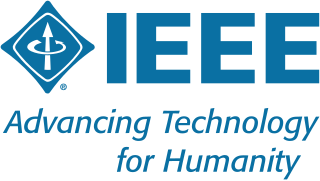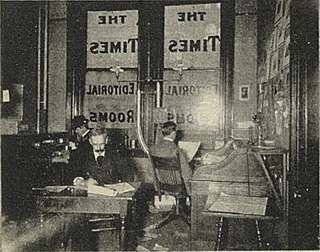
The Institute of Electrical and Electronics Engineers (IEEE) is a 501(c)(3) professional association for electronic engineering and electrical engineering with its corporate office in New York City and its operations center in Piscataway, New Jersey. It was formed in 1963 from the amalgamation of the American Institute of Electrical Engineers and the Institute of Radio Engineers.

Editing is the process of selecting and preparing written, photographic, visual, audible, or cinematic material used by a person or an entity to convey a message or information. The editing process can involve correction, condensation, organisation, and many other modifications performed with an intention of producing a correct, consistent, accurate and complete piece of work.

A landscape architect is a person who is educated in the field of landscape architecture. The practice of landscape architecture includes: site analysis, site inventory, site planning, land planning, planting design, grading, storm water management, sustainable design, construction specification, and ensuring that all plans meet the current building codes and local and federal ordinances.

The Sydney Morning Herald (SMH) is a daily compact newspaper published in Sydney, New South Wales, Australia, and owned by Nine. Founded in 1831 as the Sydney Herald, the Herald is the oldest continuously published newspaper in Australia and "the most widely-read masthead in the country." The newspaper is published in compact print form from Monday to Saturday as The Sydney Morning Herald and on Sunday as its sister newspaper, The Sun-Herald and digitally as an online site and app, seven days a week. It is considered a newspaper of record for Australia. The print edition of The Sydney Morning Herald is available for purchase from many retail outlets throughout the Sydney metropolitan area, most parts of regional New South Wales, the Australian Capital Territory and South East Queensland.

Carlton & United Breweries (CUB) is an Australian brewing company based in Melbourne and owned by Japanese conglomerate Asahi Breweries. Its notable brands include Victoria Bitter, Carlton Draught, Foster's Lager, Great Northern, Resch's, Pure Blonde and Melbourne Bitter.

The Editors' Association of Canada, or Association canadienne des réviseurs in French, is a professional organization for editors. The association has about 1,500 members, representing both salaried and freelance editors who work with individuals and organizations in the corporate, technical, government, not-for-profit, and publishing sectors.
Photography Studies College, commonly abbreviated to PSC, is a privately owned independent tertiary photography college established in 1973, located in Melbourne, Victoria, Australia.
The Australian Society of Soil Science Incorporated (ASSSI) was founded in 1955 to "advance soil science in the professional, academic, and technical fields". The Society consists of a federation of branches operating the 'umbrella' of the ASSSI Federal Council.
Australian Screen Editors (ASE) was founded in 1996 by Henry Dangar and Jenny Ward. The guild is "dedicated to the pursuit and recognition of excellence in the arts, sciences and technology of motion picture and televisual post production. It aims to promote, improve and protect the role of editor as an essential and significant contributor to all screen productions."

Beatrice Deloitte Davis was Australia's first full-time book editor, appointed by Angus & Robertson in 1937. She nurtured a generation of writers and "helped shape Australian literature for half a century".

Prof. B. S. Sahay is the Founder Director, Indian Institute of Management Jammu. He was the Founder Director of Indian Institute of Management (IIM) Raipur, Management Development Institute (MDI), Gurgaon and Institute of Management Technology (IMT), Ghaziabad. Sahay completed his BTech from BIT Sindri and received his MTech and PhD from Indian Institute of Technology Delhi.
Harriet Edquist is an Australian curator, and Professor of Architectural History in the School of Architecture and Design at RMIT University in Melbourne. Born and educated in Melbourne, she has both published widely on and created numerous exhibitions in the field of Australian architecture, art and design history. She also contributes to the production of Australian architectural knowledge as editor of the RMIT Design Archives Journal and is a member of the Design Research Institute at RMIT University.
Karen Burns is an architectural historian and theorist based in Melbourne, Australia. She is currently a senior lecturer in architecture at the Melbourne School of Design, University of Melbourne.
Gill (Gillian) Matthewson is a New Zealand architect, scholar and educator, based since 2016 at Monash University in Melbourne, Australia.

The Australian Institute of Management Education and Training Pty Ltd, commonly known as AIM or AIMET, is an Australian education provider. Its courses include business, management and leadership. AIM offers short courses, nationally accredited qualifications, post-graduate higher education and corporate solutions. Campuses and offices are located in New South Wales, Australian Capital Territory, Queensland, South Australia and Victoria.
Lisa Margaret Lines is an academic editor, historian, author and former lecturer in history at the University of New South Wales Canberra. She specialises in the history of the Spanish Civil War and the prevalence and influence of plagiarism and academic integrity in higher education.

Anna Mackenzie is a New Zealand writer of contemporary, historic and speculative fiction for adult and young adult audiences. She has won numerous awards for her writing and also works as an editor, mentor, teacher of creative writing programmes and public speaker at festivals and in schools.
The Military Historical Society of Australia (MHSA) is a voluntary organisation formed in 1957, focused upon promoting research and study of Australia's military history. Administered by a federal council based in the Australian Capital Territory, the society has state and regional branches in all states of Australia, except New South Wales, which split from the organisation in 1968. The society has published a quarterly journal, Sabretache, continuously since mid-1958.
Hilary L. Rubinstein is an Australian historian and author. She researches and writes on British naval history and modern Jewish history.









